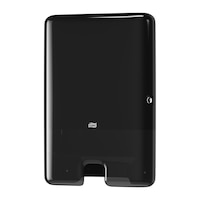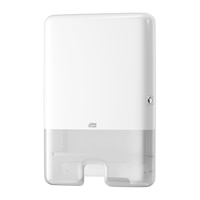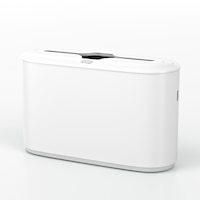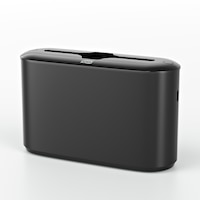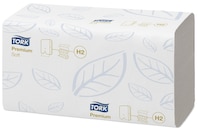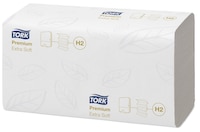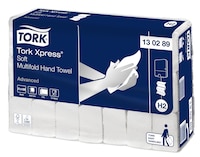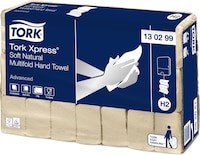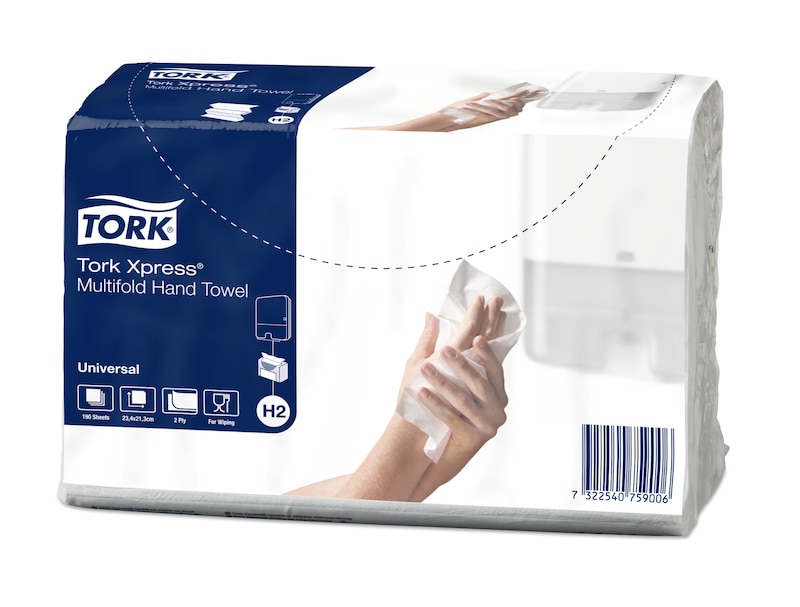

Tork Xpress® Multifold Hand Towel
Description
- Good value for money hand towel suitable for basic needs
- Unique Tork Polypack: Towels can be dispensed from the pack and used where ever needed
- One-at-a-time dispensing for reduced consumption and increased hygiene
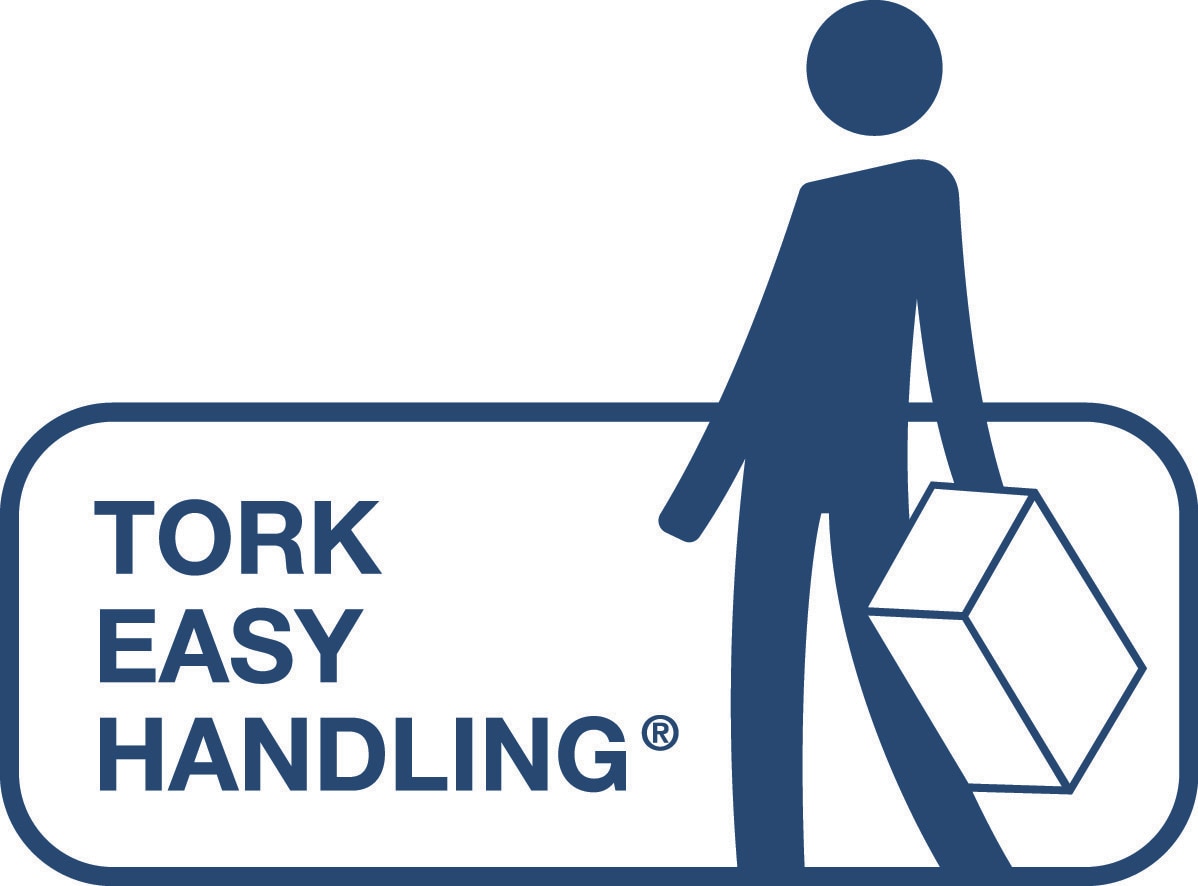
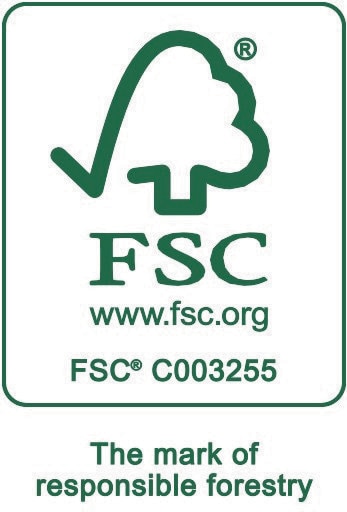
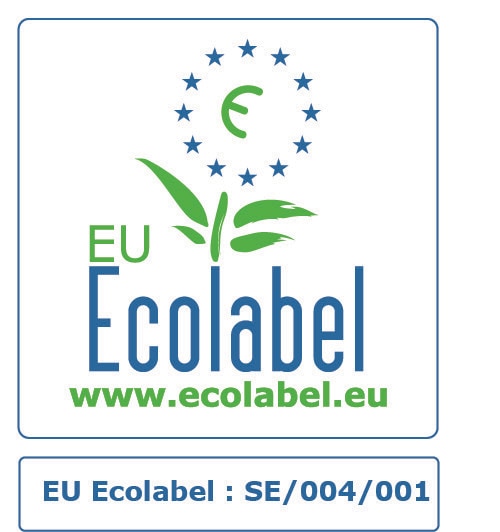
Product and delivery data
Delivery data
Carbon emission
- Tork Xpress® Multifold has an average cradle-to-grave carbon footprint of 11.7 g CO2e per use, with cradle-to-gate part 8.0 g CO2e per use.****
- Carbon neutral certified dispensers in Image line – produced with certified renewable electricity and compensated with climate projects.*****
- Fit almost twice as many towels per truck with Tork Xpress Multifold compressed towels – contributes to reducing CO2 emissions on transportation.******
Use and waste
- Reduce refill frequency with a one-at-a-time dispensing system that helps control consumption and reduce waste.*******
- Tork hand towels can be recycled into new tissue via Tork PaperCircle®********
- Switching from Tork C-fold to Tork Xpress Multifold Compressed will help reduce waste with 26%.*********
Hygiene
- One-sheet-at-a-time dispensing helps to minimise cross-contamination.*
- Drying hands with Tork paper towels will reduce more bacteria.**
- Refills are third-party verified for short-term food contact.
- Dispensers are certified Easy to use.***
- Tork Easy Handling® ergonomic packaging for easier carrying, opening and disposal.
Materials
- EU Ecolabel certified refills – reduced environmental impact across the product life cycle
- FSC® certified refills – made from responsibly sourced fibre
- Most of the plastic packaging for refills are made from at least 30% post-consumer recycled plastic (rest to come by end of 2025).**********
- Tork Xpress Soft Natural Multifold Hand Towel is made from 100% recycled fibres, the colour comes from recycled cardboard boxes as one of the fibre sources.
- The Tork Xpress Multifold compressed range reduces packaging material with up to 27%.***********
References
*Used in conjunction with articles 100297, 120289, 150299
**When washing with soap, water vs only using soap and water. Based on modified EN 1499 standard, tested with E. coli., using Tork Mild Soap refill art. 420501 and Tork PeakServe refill art. 10058.
***Certified by the Swedish Rheumatism Association.
****Represents the Tork Xpress® Multifold European refill assortment per user occasion. Based on third party reviewed life cycle assessments (LCA) covering all refill quality tiers combined with consumption data. Because this data is a system average, it is not intended to be used in carbon reporting for specific articles and consumption.
*****Only valid for Image line, for dispensers sold or leased in Europe (except France) from May 2023. ClimatePartner certified product: www.climate-id.com/en-gb/9VIUDN
******Compared to equivalent Tork standard folded towel and based on number of towels fitting on a pallet.
*******Dispensability tests performed with Tork hand towel articles
********Available in select countries.
*********Comparing average weight of Tork 471114 and 290265 with average weight of Tork 100888, 100889 and 120454
**********Check the catalogue to see individual product certifications and claims.
***********Compared to equivalent Tork standard folded towel.
Content
The product is made from
Recycled fibres
Chemicals
The packaging material is made from paper or plastic.
Material
Recycled fibres
Recycling of paper is an efficient use of resources as the wood fibres are used more than once.
High demands are put on quality and purity of recovered paper, considering each step of the chain (collecting, sorting, transporting, storage, use), to ensure safe and hygienic products.
Recycled fibres can be produced from different types of recovered paper, such as collected newsprint, magazines, office waste, paper cups, drink cartons, corrugated boxes and paper hand towels. The choice of recovered paper grades is made for each product, depending on its specific requirements on performance properties and brightness. The paper is dissolved in water, washed and treated with chemicals under high temperature and screened to separate out impurities.
Bleaching of pulp, used for tissue, is primarily a process to remove substances that could have a negative effect on important properties of the finished product such as purity, absorption, strength and colour of the pulp.
Bleaching of the recycled fibre pulp is done using chlorine-free bleaching agents (hydrogen peroxide and sodium dithionite). Some of our products are bleached and some are not.For bleached products we use bleaching agents (to increase the brightness of pulp from recovered paper).
Chemicals
All chemicals (process aids as well as additives) are assessed from an environmental, occupational health and safety and product safety point of view.
To control product performance we use additives:
- Wet strength agents (for Wipers and Hand Towels)
- Dry strength agents (are used together with mechanical treatment of the pulp to make strong products like wipers)
- For coloured papers dyes and fixatives (to secure perfect fastness of the colour) are added
- For printed products printing inks (pigments with carriers and fixatives) are applied
- For multi ply products we often use water soluble glue to secure the intregrity of the product
In most of our mills we do not add optical brighteners but it often occurs in recovered paper since it is used in printing paper.
We do not use softeners for professional hygiene products.
High product quality is secured through quality and hygiene management systems throughout production, storage and transport.
In order to maintain a stable process and product quality the paper manufacturing process is supported by the following chemicals/ process aids:
- defoamers (surfactants and dispersing agents)
- pH-control (sodium hydroxide and sulphuric acid)
- retention aids (chemicals that help to agglomerate small fibres to prevent fibre loss)
- Coating chemicals (that help to control the creping of the paper to make it soft and absorbent)
To reuse broke and to utilise recovered fibres we use:
- Pulping aid (chemicals that help to repulp wet strong paper)
- Flocculation chemicals (that help to clean out printing inks and fillers from recovered paper)
- Bleaching agents (to increase the brightness of pulp from recovered paper)
In the cleaning of our waste water we use flocculation agents and nutritients for the biological treatment to secure that no negative impact on water quality comes from our mills.
Food Contact
This product fulfills the legislative requirements for Food Contact materials, confirmed by external certification performed by a third party. The product is safe for wiping food contact surfaces and may also come occasionally into contact with foodstuffs for a short period of time.
Environmental certification
This product is certified with the EU Ecolabel with certificate number SE/004/001.
This product is certified for FSC® with certificate number SA-COC-008266.
Packaging
Fulfilment of Packaging and Packaging Waste Directive (94/62/EC): Yes
Article creation date and latest article revision
Date of issue: 19-04-2019
Revision date: 06-09-2024
Production
This product is produced at Nokia mill, FI and certified according to ISO 9001, ISO 14001 (Environmental management systems), OHSAS 18001 and FSC Chain-Of-Custody.
Destruction
This product is mainly used for personal hygiene and can be collected together with household waste.
Essity UK Ltd, Southfields Road, Dunstable, Bedfordshire LU6 3EJ, United Kingdom





